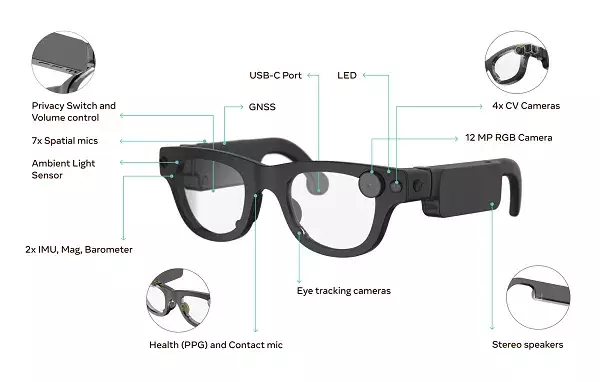Meta’s foray into augmented reality (AR) with its Aria Gen 2 glasses illustrates an ambitious trajectory toward redefining how we interact with the digital world. In its latest updates, the tech giant revealed impressive advancements that signal a departure from conventional portable technology. By focusing on creating a device that is not only practical but also fashionable and accessible, Meta is cementing its role as a forerunner in the AR landscape. This nuanced approach is not just about adopting new technology, but about revolutionizing the gap between the digital and physical realms.
Design: Function Meets Fashion
One of the standout updates concerning the Aria Gen 2 is its design ethos, which emphasizes lightweight construction and aesthetic appeal. Weighing between 74 to 76 grams, the glasses exemplify the delicate balance between sophisticated technology and everyday wearability. The inclusion of multiple size variations—eight, in total—ensures that a diverse array of users can find their ideal fit. This strategy acknowledges the human factors that often influence technology adoption, such as comfort and individual physiological traits.
Additionally, the introduction of folding arms marks a significant design advancement. By accommodating ease of storage and transport, it aligns the device with contemporary lifestyle needs, further encouraging users to integrate AR into their daily lives. Gone are the days of bulky and impractical wearables; Meta is positioning AR glasses as an essential accessory rather than a cumbersome gadget.
Advanced Technology: Enhancing User Experience
From improved camera sensors capable of adapting to varying light conditions to expanded visual fields, Aria Gen 2 demonstrates that Meta is serious about practical utility as a guiding principle in its AR developments. Coupled with contact microphones embedded into the nose pad, these enhancements cater to users’ needs for high-quality audio and visual experience in diverse environments. Such improvements are not merely incremental; they represent a holistic effort to transform how users engage with both their surroundings and digital interfaces.
The integration of eye and hand tracking capabilities is equally revolutionary. By allowing users to interact with digital elements through natural gestures, Meta is not simply upgrading technology; it is reshaping the user experience itself. This approach moves away from the static nature of smartphones, steering toward a more intuitive and immersive interaction model.
The Future of Interaction: A Paradigm Shift
Meta CEO Mark Zuckerberg’s vision of AR glasses as a pivotal device—potentially replacing smartphones—challenges the societal norms surrounding technology use. The notion of people engaging in animated hand gestures or seemingly conversing with virtual elements in public may seem bizarre today, yet history shows that society rapidly acclimatizes to such shifts. As augmented reality becomes integrated into daily life, we could witness a fundamental redefinition of how communication and interaction take place in both personal and communal contexts.
While the prospect of private interactions becoming public performances might elicit a mix of intrigue and skepticism, the possibilities that come with immersive experience are undeniable. Engaging with remote individuals through AR could usher in new forms of communication, blurring the lines between the physical and digital realms in ways we are only beginning to imagine.
An Open Future: Developer Engagement and Consumer Launch
A pivotal next step for Meta is its commitment to opening the Aria Gen 2 platform for external developers later this year. This decision reflects a broader understanding that the potential of AR cannot be fully realized by a single entity alone. Collaborative innovation will not only encourage diversification in application development but also foster a robust ecosystem where creativity drives functionality.
Looking ahead to a planned consumer launch in 2027, this marks an exciting juncture for both Meta and AR technology. By focusing on creating an engaging platform, Meta is setting the stage for an explosion of interactive content, experiences, and applications. As we stand on the brink of this technological revolution, the anticipation of how AR will shape our world remains palpable, promising to redefine connectivity and interaction for generations to come.

